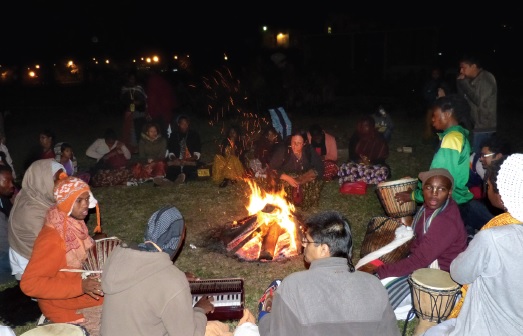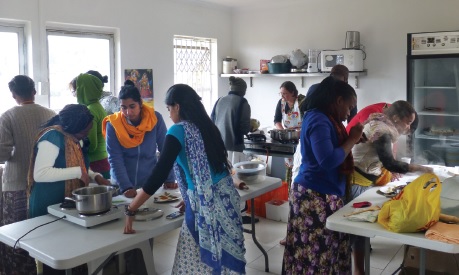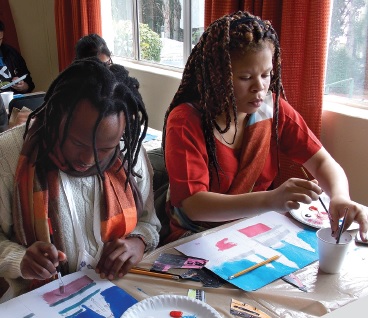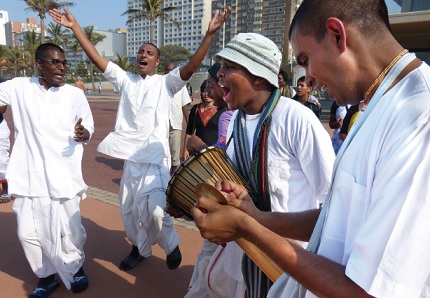
South Africa is ready for Krishna consciousness, with BYS students leading the way.
I see his mane of bobbing dreadlocks. Over one shoulder hangs a backpack with a button that reads “Proudly South African.” A giant psychology textbook tucked under his arm, he approaches the Westville campus hangout. I whip out a flyer, compelling him to stop.
“Dreadlocks” glances over the words “Mantra Meditation” and “Free Vegetarian Feast.” His eyes come alive. A bright white smile illuminates his dark skin.
I remember why I’m standing here in the cold drizzle, enduring blaring music under harsh neon lights. It is this simple act of sharing with another human being an opportunity to connect to Krishna .
After looking at my watch, I quicken my pace and head off to the Bhakti Yoga Society (BYS) program we’re holding in the same building where Srila Prabhupada lectured forty years ago. He recognized the potential for reaching out to students, who were young and intelligent and therefore most likely to appreciate his gift. More than building a temple in Durban or celebrating a Rathayatra festival, he stressed spiritual education at universities.
Westville campus was Durban’s designated Indian university during apartheid. After Srila Prabhupada’s visit, his followers worked diligently to maintain regular programs at BYS, the campus wing of the Hare Krishna movement. Partha Sarathi Dasa Goswami recalls how during the late seventies he alone or with a few other devotees hosted the program, armed with only a video projector and oatmeal cookies. Even so, more than a hundred students attended. Visiting “White universities” was risky; the students in general were unwelcoming, and some yelled offensively or even threatened the devotees. And an African university was practically unheard of.
I reach the room. There is Mdu, one of our regulars who comes from an African family and practically grew up in a church. Next to him is Tae-Hun Lee, a post-doctorate mathematician from South Korea with a natural inclination to serve humanity. Revaan is an engineering graduate trying to understand the roots of his Indian culture. Next to him is Claire Burke, an astronomer from the UK. Joe and Jack, two blind African students, enter. They had the Hare Krishna mantra typed out in Braille, and they love to learn Bhagavadgita verses by ear. Thobile leads them into the room. She is crazy about kirtana and starts the chanting with her rich, soulful voice.
 I get a text message from David and Luke, two white undergraduates who love yoga: “Caught in yet another physics quiz. Going to miss the program.”
I get a text message from David and Luke, two white undergraduates who love yoga: “Caught in yet another physics quiz. Going to miss the program.”
The colorful mixture of cultures in the room reminds me of the risks taken by the pioneer devotees and the blood and sweat of all those succeeding them. Now students bear fewer scars of oppression, and programs are multiracial. Srila Prabhupada’s gift is for everyone.
BYS operates on five campuses in Durban, a total of eight programs a week. Each session includes kirtana, a topical discussion, and prasada. Some programs are optional classes within the academic timetable. Others are later in the day and cater to residential students. Second-level sessions are tailored to students who want to adopt serious spiritual practices. BYS teams up with Food For Life to host a free lunch once a week at different campuses. Over the years, BYS has held a variety of campus festivals, delivering Krishna consciousness through meditation, hip hop, poetry, and food art. Once a month students visit our Temple of Understanding in Chatsworth.
Durban is not the only hotspot; South Africa is buzzing with soulsearching students. Fast-paced Gauteng is home to four major universities, all with active BYSs that also offer hatha yoga sessions and the much adored “Evenings of Kirtana.” At the University of Witwatersrand (WITS), BYS received an award for Most Outstanding Society in 2014 by Public Protector Advocate Tuli Madonsela. WITS BYS hosts an annual “Spring Fest,” which through exhibitions and campus parades promotes spiritual culture. And the fruits are clearly visible. Five young WITS graduates are serving in leadership positions in ISKCON South Africa.
 A Natural Attraction
A Natural Attraction
Dreadlocks walks in during the kirtana. His hands find the jembe drum like a long-lost cousin. He catches sight of the pull-up banner with the Hare Krishna mantra, and it doesn’t take long for him to connect the dots. He begins miming the words. The African people are gifted with rhythm and beat in their blood. Simply share the holy name with them, and it becomes as natural as breathing. Watching him, I remember “By once chanting the holy name of the Lord one can be freed from the reactions of more sins than he can even imagine performing.” (Prema-vivarta) How powerful is the act of sharing! A simple flyer, a smile, and now the holy name transforms another life.
Not all campuses have been spiritually fertile. In the eighties Indradyumna Swami and Bhakti Brnga Govinda Swami visited Stellenbosch University, in the Western Cape, without much success. In the last ten years, however, student outreach at Stellenbosch has planted seeds that have grown roots. By offering a meticulous syllabus, meditation seminars, and student wellness programs, devotees are carefully watering the sprouts of devotion. They operate from a house in which students can rent rooms and benefit from daily spiritual practice and prasada with devotees. Last year marked their first “Buddhafest: Celebrating Awakening,” which attracted students with a taste for meditation and thought-provoking entertainment. Students in Stellenbosch have shown rapid and steady progress. A group of twelve serious practitioners visited holy places in India during the campus break in 2014.
Speaking to the Heart
It’s discussion time at BYS. “Life doesn’t really make sense, does it?” I ask. “The equation doesn’t balance. We are born. Soon it’s all about getting an education. We hunt for a job, create a family, and die. What is the point of it all? Shouldn’t we ask why?”
 Looking straight at me, Dreadlocks doesn’t flinch.
Looking straight at me, Dreadlocks doesn’t flinch.
“We are driven by the taste of happiness. It is what we want most, right? Yet even those who have all the things we want can’t shrug off the feeling of being unsatisfied. Is it surprising that happiness slips through our fingers? How can we be happy if we are not even sure who we are? It seems like you’re an African man and I’m an Indian woman.
Yet don’t we feel the same pain?” He nods. His eyes show he has seen suffering. It’s the basics. Yet it always shocks me how Srila Prabhupada’s simplest teachings can strike the core of any human being.
During his first strawberry-halava experience, Dreadlocks notices a book lying on a table nearby. It is the latest publication of the Africa branch of the Bhaktivedanta Book Trust (BBT) in the Zulu language. I see his surprise.
“In Zulu?” he asks, flipping through the pages.
“If you talk to a man in a language he understands, that goes to his head. If you talk to man in his language, it goes to his heart.” [Nelson Mandela]
I say a silent thank you to Krishna for BBT Africa.
Printing books in local languages has spurred book distribution in South Africa. Devotees are adapting fresh ideas like self-serve smart boxes that allow people to choose a book and leave the cash in a secure compartment. The thirty-seven smart boxes in Durban alone sold 750 books in four months. Exclusive Books, a leading bookseller in South Africa, stocks selected books by Srila Prabhupada in eighty percent of its Durban stores. Traditional methods like door-to-door sales and traveling parties still form the core of book distribution. During the December Book Marathon, some students fill their backpacks with books and meet people on the street. Others choose a creative route: in 2013 a contemporary short drama called “Hip-Hop Gita” helped distribute five hundred Bhagavad-gitas. Book sponsorships by donors allow devotees to offer books to students at discounted rates. In 2014 the number of books distributed in Durban increased by thirty-three percent over the previous year.

I find out that Dreadlocks is Fortune Ndlovu. He is from Ladysmith, a rural town in northern KwaZulu- Natal, and is staying on campus. I invite him to the national student retreat to be held in July at the Temple of Understanding. Sixty students from all over South Africa will converge for the four-day winter retreat, and only a few slots remain.
July arrives, and the retreat focuses on the theme “My Spiritual Journey.” A cooking course equips students with vegetarian survival skills. Interactive group projects culminate in artistic presentations. Evenings are spent around a campfire, with kirtanas and dramatic stories from the Śrimad-Bhagavatam. On the last day, the women sport colorful saris and decorated faces, the men appear in dhotis. They head out onto the city promenade for a beach kirtana.
Fortune is there, chanting, dancing, and having the time of his life.
Rukmini Devi Dasi is a disciple of Kadamba Kanana Swami. She has a master’s degree in chemical engineering and serves full time at ISKCON Durban, overseeing BYS.
